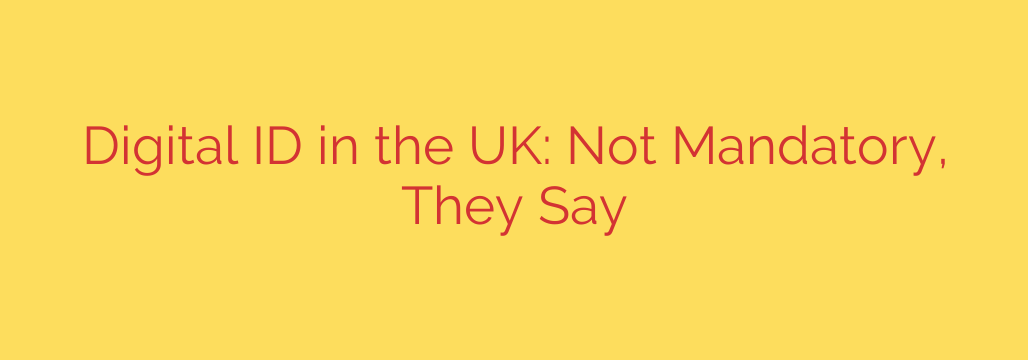
UK Digital ID: Voluntary Convenience or a Path to Mandatory Tracking?
The concept of a unified digital identity is gaining momentum in the UK, promising a future where accessing government services, proving your age, or verifying your employment is as simple as a few taps on your phone. The government’s “One Login” system is at the forefront of this push, presented as a secure and, crucially, a voluntary tool for modern life.
However, while the official stance emphasizes choice, a growing number of voices are raising concerns about the long-term implications. The central question is a critical one: will this “voluntary” system eventually become mandatory in all but name, creating a new set of challenges for privacy, security, and social inclusion?
The “Voluntary” Question: Is It Really a Choice?
On the surface, the proposal is straightforward. Instead of juggling dozens of different accounts and passwords for services like HMRC, the DVLA, or the NHS, a single, government-verified digital ID would provide seamless access.
The official line is that these systems are entirely voluntary. Proponents argue they are about offering a more convenient option, not removing existing ones like in-person verification or paper documents. The goal, they say, is to streamline processes in a digital-first world.
The concern, however, lies not with the current proposal but with the potential for “function creep.” History shows that systems introduced for a specific, limited purpose can quickly expand their scope. If digital ID becomes the easiest—or eventually, the only practical way—to access essential government services, it ceases to be a choice. This could lead to a two-tier system where those without a digital ID face significant hurdles in their daily lives, from filing taxes to accessing healthcare benefits.
Key Concerns Surrounding a National Digital ID
Beyond the debate over its voluntary nature, the push for a centralized digital identity raises several significant red flags that warrant serious consideration.
1. The Risk of Digital Exclusion
A significant portion of the population is not equipped for a digital-by-default world. This includes the elderly, those in rural areas with poor connectivity, low-income individuals who cannot afford the necessary devices, and anyone who simply lacks digital literacy. Forcing essential services through a digital-only gateway risks leaving the most vulnerable members of society behind. Relying on traditional methods could become increasingly slow and difficult, effectively penalizing those who cannot or choose not to opt in.
2. Centralized Data and Security Risks
Creating a single database that links a person’s identity to a vast array of services—from their tax records and driving license to their health information—creates a massive target for cybercriminals. A successful breach of a national digital ID system would be catastrophic, potentially exposing the sensitive personal data of millions of citizens in one go. While the government assures us of robust security, no system is impenetrable. The potential for identity theft and fraud on an unprecedented scale cannot be understated.
3. Privacy and Surveillance Implications
A unified digital ID system provides the state with a powerful tool to monitor the activities of its citizens. Every interaction with a government service could be logged, creating a detailed digital footprint of an individual’s life. Critics worry this could pave the way for increased state surveillance, tracking everything from where you travel to what benefits you claim. While intended for administrative efficiency, the potential for misuse in the future remains a profound concern for civil liberties.
How to Protect Your Digital Identity
As the digital landscape evolves, it’s more important than ever to be proactive about safeguarding your personal information.
- Stay Informed: Keep up to date with the government’s digital ID proposals. Understand what data is being collected and how it will be used before you consider signing up for any new system.
- Strengthen Your Digital Security: Regardless of government initiatives, use strong, unique passwords for all your online accounts. Enable two-factor authentication (2FA) wherever possible to add a critical layer of security.
- Be Cautious with Data Sharing: Be mindful of which third-party applications you grant access to your personal information. Question why a service needs certain data and only provide what is absolutely necessary.
- Voice Your Concerns: If you are worried about the direction of digital ID in the UK, consider contacting your local MP to share your views. Support organisations that advocate for digital rights and privacy.
While the convenience of a digital ID is an attractive prospect, it must not come at the cost of personal freedom, privacy, and inclusion. The path forward requires a careful, transparent, and public-led debate to ensure that any new system serves the people, rather than creating new methods of control and exclusion.
Source: https://go.theregister.com/feed/www.theregister.com/2025/10/03/uk_digital_id_clarity/








